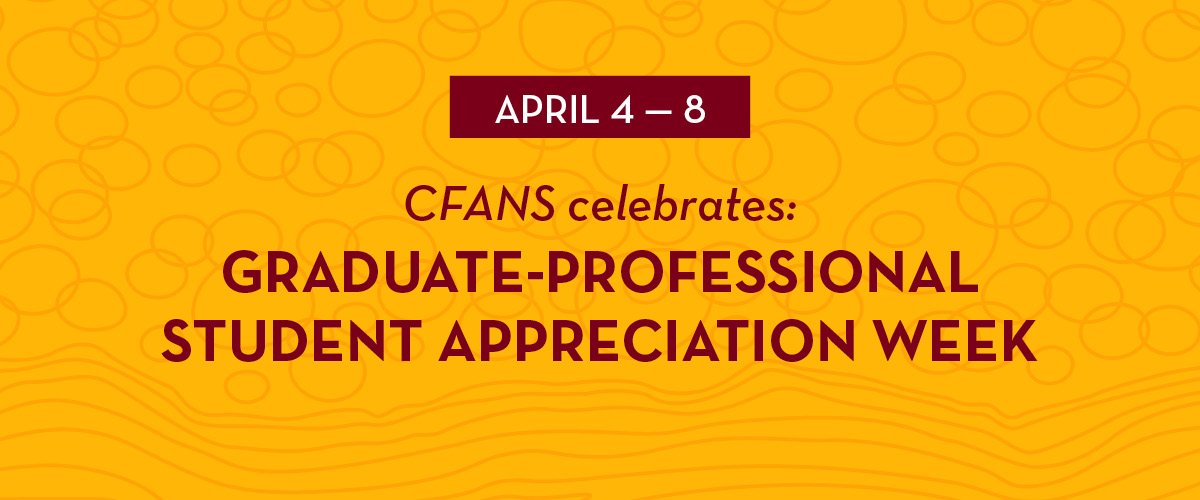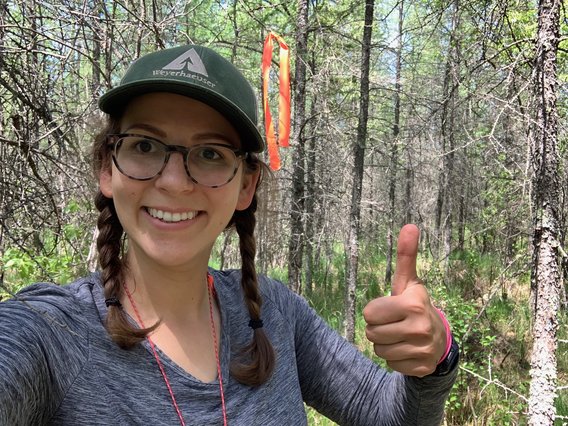
Envisioning a better tomorrow
Why CFANS? Grad students Siane Luzzi Chirpich and Amy Shaunette share their answers.

University of Minnesota CFANS graduate students Siane Luzzi Chirpich and Amy Shaunette may be passionate about different fields of study, but they both aim to solve tomorrow’s problems in new ways. As we commemorate Graduate Professional Student Appreciation Week from April 4 through April 8 this year, we celebrate their accomplishments and look forward to seeing their contributions to the scientific community, along with those of our many CFANS graduate students.
Luzzi Chirpich is a PhD candidate in the Department of Bioproducts and Biosystems Engineering, and Shaunette is a master’s student in the Department of Forest Resources. Here they share more about their CFANS experience.
Siane Luzzi Chirpich
From a small town in the south of Brazil, Siane Luzzi Chirpich arrived at the U of M Twin Cities in Fall 2017 to start her master’s degree in Bioproducts and Biosystems Engineering (BBE). During that time her work focused on dairy wastewater treatment, and she enjoyed spending summers alongside associate professor Brad Heins, PhD, and the late assistant professor Rob Gardner, PhD, at the West Central Research and Outreach Center in Morris, MN. As a master’s student, she produced multiple publications and presented at regional, national and international academic events.
With a bachelor’s degree in environmental and sanitary engineering, Siane continued to pursue her educational interests in soil and water remediation by enrolling in CFANS’ BBE PhD program. She teaches a course with adjunct assistant professor Koray Sekeroglu, PhD, each fall and intentionally incorporates engineer thinking into the curriculum. “The students get very excited to design real bioreactors and hear about my hands-on experiences, many of which I had while I was a master’s student,” Siane said.
She looks forward to sharing the results of her research, which is in its last year thanks to the support of her current advisor and research professor Joe Magner, PhD. Working in collaboration with various groups across the University, Siane’s dissertation focuses on the wide-ranging pathways of nitrogen in the sandy soils at particular Minnesota locations.
In nearly five years at CFANS, Siane has received scholarships from the Minnesota Ground Water Association, the Graduate Student Board and the American Association for the Advancement of Science. She also served as a representative in the Council of Graduate Students and Council of International Graduate Students and is currently the CFANS Graduate Student Board chair, after two years as the BBE representative.
"The BBE department has given me lots of opportunities to grow as a professional. I have collaborated with many different researchers and students over the years, from inside and outside academia,” Siane said. “I developed my leadership skills by participating in many different student boards and by interacting with undergraduates, teaching them in the classroom and training them in the field."
All of the diverse experiences she has been exposed to during her time in CFANS have made her feel confident about her professional skills and intrapersonal relationships. In the future, she hopes to be a reference in sustainability technology and give back to the UMN community by being a mentor to students and giving guest lectures.
Amy Shaunette

Growing up in Portland, OR in a state where some trees are 1,000 years old or older, Amy moved to Minnesota to attend college for a bachelor’s degree in English. After graduation, she worked in marketing and nonprofit administration for several years before coming to the U of M to study forestry – with one stop along the way.
Amy quit her job at a graphic design agency to live and work on a small organic vegetable farm in rural Wisconsin. “I needed a break to figure things out, but I wanted that break to be productive, and there’s nothing more productive than farming,” she said. “I discovered how much I loved performing tough physical work outside, so I started brainstorming jobs that would allow me to work outdoors in nature.” While at the farm, Amy was exposed to various aspects of environmental science and learned about natural resource management programs at the University of Minnesota. After completing her bachelor’s degree in forestry, Amy was invited by assistant professor Marcella Windmuller-Campione, PhD, to join a research project focused on tamarack – one of her favorite trees – and because of that opportunity, she decided to pursue a master’s degree.
With Marcella as her advisor, Amy worked on research that explored tree regeneration in northern Minnesota tamarack forests that have been impacted by eastern larch beetle (ELB). An unprecedented ELB outbreak has decimated Minnesota’s tamarack forests for the past 20 years. In collaboration with the MN DNR Division of Forestry, their project combines many of Amy’s research interests: silviculture, disturbance ecology, forest health, botany and dendrochronology. They hope the project will ultimately help foresters manage tamarack effectively. “I went back to school because I developed enthusiasm for science and the outdoors later in life and wanted to do work that made the world at least a little bit better,” Amy said.
After graduating this May, Amy will work as a forester for the U.S. Forest Service in the Tahoe National Forest in northern California. As the recipient of numerous scholarships and fellowships, wherever she ends up in the future, she’d like to be surrounded by conifers and actively managing forests. “For me, forestry is about joy. I hope I never lose the excitement I feel when I see a pine tree thick with cones, or a new spring bud leafing out,” she said.
We are CFANS proud of each graduate student in the College and continue to be inspired by the incredible contributions they’ve made and continue to make. Our community, state, and the world all benefit from their exceptional research and innovation.





